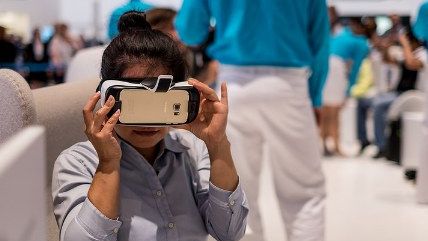Virtual Reality Will Turn Kids into Zombies! Just Like Movies, Advertising, Video Games, and Rock Music Did!
Is it too soon to panic over a thing kids barely have access to, yet? No, don't be silly.


Virtual reality goggles are just now reaching the consumer market (with hefty price tags) and there's already "But what about the children?" fretting.
In what is surely a preview of what will eventually become a chorus of media nanny worrywarts, Naomi Schaefer Riley took to the New York Post to express concerns because, well, little kids are easily scared and virtual reality is a thing that can scare them:
Unfortunately, we have no idea what the effect of putting these headsets on kids will be. And the manufacturers seem to acknowledge that. Samsung's manual for its Gear VR reads: "Not for use by children under 13. Watching videos or playing games with the Gear VR may affect the visual development of children. When children, age 13 or older, use the Gear VR, adults should limit their usage time and ensure they take frequent breaks. Adults should monitor children closely after using the Gear VR if children feel discomfort." Ha!
What are the chances such a device would be in the home of any kid and they wouldn't actually get the chance to use it? Pretty slim. But parents should beware. Kids who are still getting used to what is a part of the real world may not be ready for a virtual one yet.
The headline for Riley's piece, "Virtual reality will completely transform children into zombies," is total clickbait. There isn't so much as a single word in her musing that suggests that VR will dull their wits. In fact, her fear is the exact opposite—she's worried that virtual reality is far too intense for children. Then, weirdly, her personal experience suggests that the problem solves itself anyway (children themselves are inclined to opt out of experiences they find too intense—even when adults don't recognize the fear factor).
But Riley also worries about virtual reality being marketed toward children. This might explain where the headline came from. McDonald's had a special virtual reality toy in its Happy Meals in Sweden, and little inspires the fear that we're zombifying our kids quicker than a fast food chain giving out free knick-knacks.
But given that actual virtual reality googles run into the hundreds of dollars, let's be a bit skeptical about the idea that little kids in Sweden are getting them as free toys. Indeed, a look at what McDonald's is actually offering is nothing more than an updated version of the old Viewmaster toys from our own childhoods, using a smartphone instead of little paper and plastic reels. If a parent should worry at all about what this toy might do to their kids, it would probably be more likely to cause a headache due to eye strain.
Though Riley's piece is actually so reasonable to the point of obviousness (and therefore irrelevance), we will most certainly see the same level of fearmongering about the impacts of virtual reality on children and teens as we have from movies, music, video games, comic books, advertising, smartphones, or pretty much anything that engages the imagination of the young that is not a parent, government authority figure, or school textbook. The fear that the young are being influenced by entertainment or ideas that parents cannot control—and even worse, do not completely understand—has been part of our culture forever. This will be the next extremely predictable push.
Fortunately, we now have a generation of parents who grew up in arcades and playing Nintendo and Playstation. So even though virtual reality is a relatively new phenomenon (failed efforts in dying arcades in the 1990s notwithstanding), we have a class of adults now that understand this basic form of interactive entertainment, indulged in it, and turned out just fine (well, mostly) and are best equipped to manage their children's exposures.
Riley doesn't suggest any government intervention here, but we should nevertheless worry that somebody is going to decide down the line that regulation or some sort of bureaucratic nannying should come into play and set the rules for a child's exposure to this technology.
